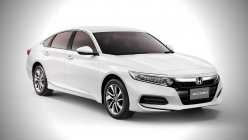The heart of the car is its engine, without it, it wouldn’t run, right? Well, a car wouldn’t run without a tire either. So, a tire is equally important. The condition of the car’s tires has an effect on the way we drive. Imagine how uncomfortable and hassle it is to drive a flat tire.
Also, the air pressure in the tires also matter. It should have the right amount of air in it. But have you ever considered filling your tires with anything other than air? What really is in our tires? Is it important?
Air is 78% nitrogen and less than 21% oxygen and the rest are water vapor, carbon dioxide, and a small number of noble gases. So, basically, that’s what the air in the car’s tires are consist of. What if we fill the tires with nitrogen? What will happen? Will there be benefits? What are the benefits we can get from a nitrogen-filled tire?
A nitrogen filled tire will be 93 to 95% nitrogen. As you can see, the difference is very minimal compared to regular air we fill on our tires. However, there are advantages of using nitrogen to fill your car’s tire.
And just like all the other things, it has disadvantages as well. If you’re considering to fill your tires with nitrogen, Philkotse.com will give you the pros and cons of nitrogen-filled tires.
1. Nitrogen-filled tires: Pros
Less leakage
As the tire’s rubber flexes and stretches while rolling and rotating, air escapes through the molecular structure of the tire. When you compare the atom of oxygen and atom of nitrogen, you’ll see that the nitrogen atoms are a little bigger. This means nitrogen is less able to escape from the tire and permeate rubber.
Air or oxygen escapes from the tire 1.6 times faster compared to nitrogen. This means less leakage from your tire, you can enjoy your nitrogen-filled tire longer. However, even if your tires are filled with nitrogen, there are still components that can affect your tires from the outside such as the oxygen from the surrounding atmosphere.
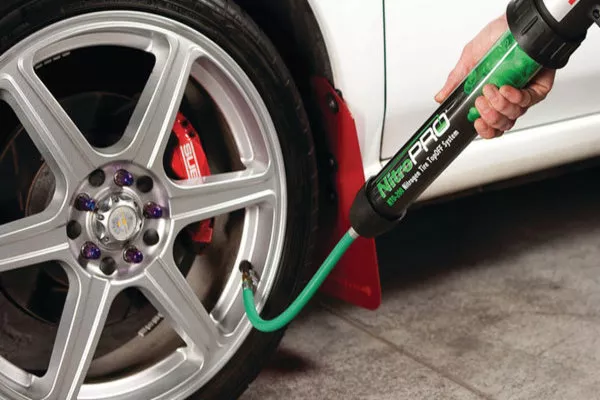
Nitrogen is less able to escape from the tire and permeate rubber
Fuel economy
The right air pressure in the tire optimizes the fuel economy of a car. The higher the tire pressure, the better the fuel economy. This is because air pressure reduces resistance.
In the case of a nitrogen-filled tire, the nitrogen stays longer, which means you don’t have to work as hard in keeping the tires properly inflated. This means it will be easier for you to get the best fuel economy.
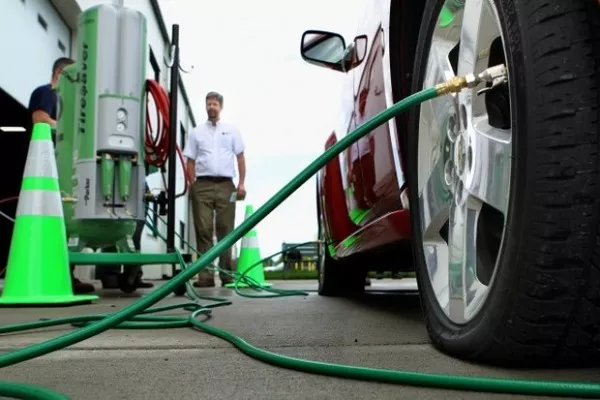
Having a nitrogen-filled tire means you don’t have to work as hard in keeping the tires properly inflated
>>> Read more: Fuel-efficient tire: Is it worth your choice?
More consistent handling
As said earlier, nitrogen-filled tires only have a minimal difference compared to a typical air-filled tire. This means nitrogen in your tires does not have the ability to improve car handling better than the way it is designed to handle. There will still be advantages but only minor, especially for our everyday driving.
However, nitrogen on tires can help in optimizing your car's handling and allows it to perform up to its limits. This is because nitrogen helps in stabilizing the car's tire pressure. It is the main reason why nitrogen is used for race car tires. But when it comes to daily driving and commute, most rivers wouldn’t be able to notice any difference.
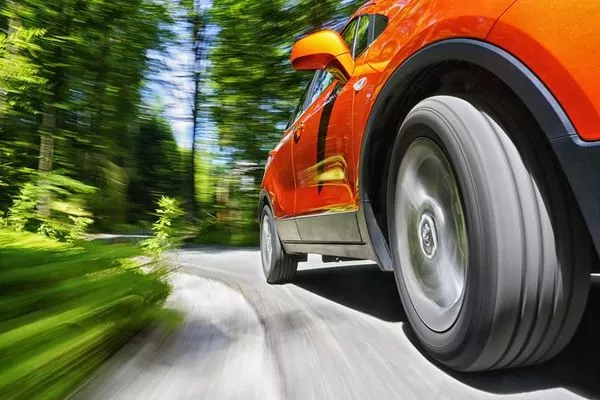
Nitrogen on tires can help in optimizing your car's handling and allows it to perform up to its limits
Reduces wear and tear
Air has water vapor while nitrogen does not. The water vapor is the one responsible for increasing the pressure in the car's tire as it heats up. For nitrogen-filled tires, wear and tear are reduced because there is no water vapor in it. Most gas stations that offer air compressors have water in the tank and/or in the hose.
This means there will be more water that will end up in your tire resulting in more water included in the mixture. In addition, water vapor also causes rusting inside the valve stem or the wheel. It also corrodes the vehicle's sensitive sensors which are used by cars with tire pressure monitoring systems.
>>> Worth your reading: The pros and cons of filling tires with nitrogen: Is it worth the hassle?
2. Nitrogen-filled tires: Cons
Inconvenience
Nitrogen sure offers many benefits but corresponding to those advantages is its cost. Yes, nitrogen costs more than air. In addition to that, it is also not available in most of the gas stations, unlike the typical air compressor. If you’re using nitrogen in your tire and you need a fill-up, you may need to look for a tire shop or you can track down a well-equipped service station.
This means, if you’re on the road and can’t find any nitrogen, you’ll have to use regular air. But remember that it will dilute the nitrogen present in your tires.
>>> You might want to read: Tips every Pinoy car owner should know to choose the right used car tires.
Time-consuming
Unlike the regular air, filling your tires with nitrogen is more complex. If it’s your first time filling up your tires with nitrogen, it is necessary to look for a tire shop that uses a machine that filters oxygen out of the nitrogen and also automates the bleed cycle or the purge.
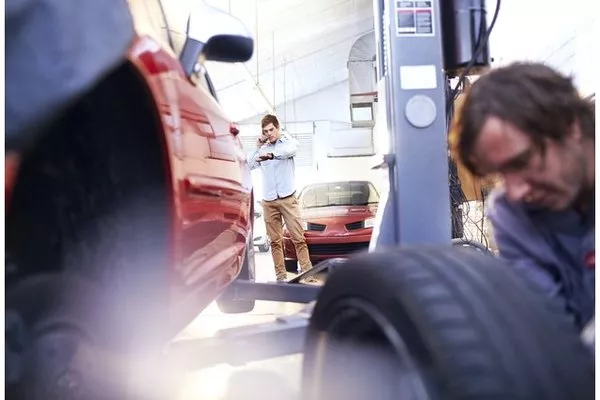
If it’s your first time filling up your tires with nitrogen, it is necessary to look for a tire shop carefully
Of course, you’ll pay for the service and it will take a little more time than a regular air compressor. In addition, if you want to take the most advantages of the nitrogen fill-up, you will need to have the tires filled and bled several times to be able to air-free as much as possible.
You might need to add nitrogen anyway
There is no guarantee that tires with nitrogen can last for a year without checking and adjusting the tire pressure. Yes, it can last longer than the regular air but you still need to check it from time to time.
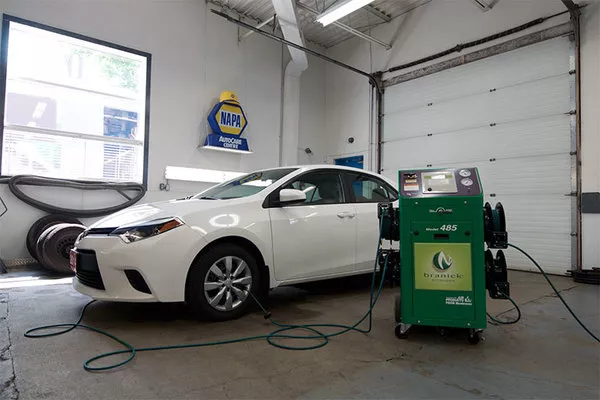
There is no guarantee that tires with nitrogen can last for a year without checking and adjusting the tire pressure
When deciding whether to switch on nitrogen or not, it’s best to know its pros and cons first. This is to temper your expectations on nitrogen-filled tires. Yes, there will be benefits but there will also be disadvantages. If you’re considering filling your car’s tire with Nitrogen, it greatly depends on you.
If you're into car racing, then nitrogen-filled tires are recommended for you. But if you're using your car for your daily routines and travel, then it is preferable to use the regular air because they only have minimal differences and air compressors can be found anywhere and are less expensive than nitrogen.
So the best advice is to stick to regular air. That will be wiser and more convenient.
Want to have more advice? Refer to our car tips and advice right now.
Recent posts
- Top 4 popular alternative fuels: Debunking the myths Aug 16, 2022
- Driving on a flat tire: Signs, warnings & tricks for Pinoy drivers Aug 16, 2022
- How to survive driving on bald tires? Jan 12, 2019
- Michelin and Bridgestone, whose tires are better? Aug 04, 2020
- Do you know this clever trick using a P1 coin to check your car’s tread depth? Nov 15, 2017


